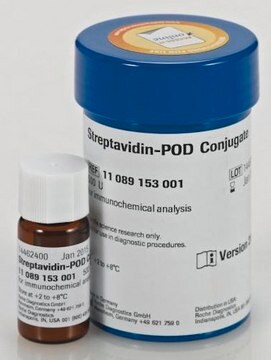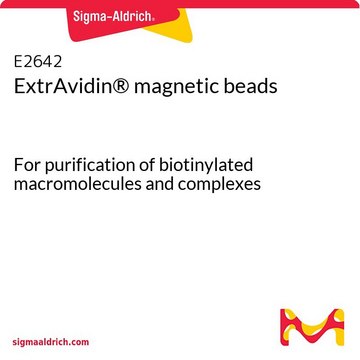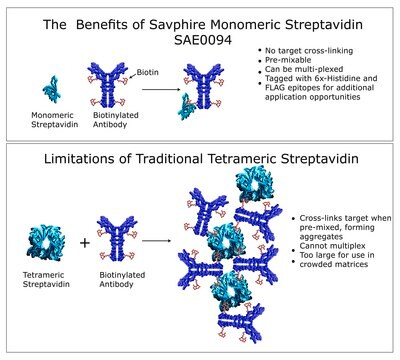03708152001
Roche
Streptavidin Mutein Matrix
suspension, pkg of 5 mL
Sign Into View Organizational & Contract Pricing
All Photos(1)
About This Item
UNSPSC Code:
12352200
NACRES:
NA.21
Recommended Products
form
suspension
packaging
pkg of 5 mL
manufacturer/tradename
Roche
parameter
4-25 °C optimum reaction temp.
shipped in
wet ice
General description
Contents
Settled resin of 50% suspension Streptavidin Mutein Matrix.
Settled resin of 50% suspension Streptavidin Mutein Matrix.
Streptavidin mutein, immobilized.
The binding of biotin to avidin/streptavidin is the strongest known noncovalent interaction of biological molecules [(Kd 0.6 x 10-15 M (avidin), 4 x 10-14 M (streptavidin)]. Strong binding provides a great advantage for certain applications of the derived biotin-avidin/streptavidin technology, such as surface immobilization, blotting technologies, immunoassays, cross-linking studies, and histochemistry. However, the use of immobilized avidin/streptavidin for the purification of biotinylated proteins is limited. In this instance, the extreme affinity of the binding partners creates a drawback of enabling elution only under very harsh conditions that usually destroy the functionality of the protein of interest.
Recombinant streptavidin technology was used to screen for a mutant streptavidin with reduced binding affinity toward biotin. By substituting three amino acids, a mutein was obtained with a biotin dissociation constant of 1.3 x 10-7 M.
The Streptavidin Mutein Matrix provides this mutein immobilized onto cross-linked agarose beads in a highly stable and regenerable form, which allows purification of biotinylated proteins that results in excellent purity and recovery.
Recombinant streptavidin technology was used to screen for a mutant streptavidin with reduced binding affinity toward biotin. By substituting three amino acids, a mutein was obtained with a biotin dissociation constant of 1.3 x 10-7 M.
The Streptavidin Mutein Matrix provides this mutein immobilized onto cross-linked agarose beads in a highly stable and regenerable form, which allows purification of biotinylated proteins that results in excellent purity and recovery.
Application
- Streptavidin Mutein Matrix: Is highly suitable for purification of biotinylated proteins
- Has been tested for use with in vitro expressed biotinylated proteins, using the RTS AviTag Biotinylation Kits
- Is convenient for purification of chemically biotinylated proteins
- It was also used in single-step affinity chromatography and affinity chromatography.
Features and Benefits
- Mild purification conditions: Low biotin dissociation constant allows elution of biotinylated proteins under gentle conditions.
- Stable: No significant loss of binding capacity upon storage. The low dissociation constant of the streptavidin mutein is obtained by genetic engineering and not by dissociation of avidin- or streptavidin tetramers.
- Economic: High binding capacity and multiple reuse allows economic handling of the matrix.
Storage and Stability
Store at 2 to 8 °C. (Do not freeze!)
Other Notes
For life science research only. Not for use in diagnostic procedures.
Storage Class Code
12 - Non Combustible Liquids
WGK
WGK 1
Flash Point(F)
does not flash
Flash Point(C)
does not flash
Certificates of Analysis (COA)
Search for Certificates of Analysis (COA) by entering the products Lot/Batch Number. Lot and Batch Numbers can be found on a product’s label following the words ‘Lot’ or ‘Batch’.
Already Own This Product?
Find documentation for the products that you have recently purchased in the Document Library.
Customers Also Viewed
Nancy G Nossal et al.
The Journal of biological chemistry, 282(2), 1098-1108 (2006-11-16)
Our previous electron microscopy of DNA replicated by the bacteriophage T4 proteins showed a single complex at the fork, thought to contain the leading and lagging strand proteins, as well as the protein-covered single-stranded DNA on the lagging strand folded
Dalia Juzumiene et al.
Nuclear receptor signaling, 3, e001-e001 (2006-04-11)
The full-length human androgen receptor with an N-terminal biotin acceptor peptide tag was overexpressed in Spodoptera frugiperda cells in the presence of 1 microM dihydrotestosterone. Site-specific biotinylation of BAP was achieved in vivo by co-expression of E. coli biotin holoenzyme
Our team of scientists has experience in all areas of research including Life Science, Material Science, Chemical Synthesis, Chromatography, Analytical and many others.
Contact Technical Service






